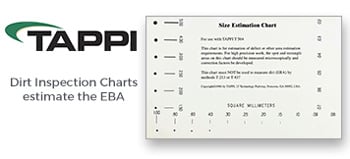|
Special self-cleaning filters allow starch spray use even in closed mill environments, potentially saving tens of millions of gallons per year in fresh water costs.
U.S. paper mills and corrugated container manufacturers
have traditionally had access to inexpensive virgin fiber that could be
mixed with hardwood or softwood to reach required strength. That has changed
in recent years, as U.S. paper mills and corrugated container manufacturers
increasingly depend on recycled fiber sources, especially for linerboard
and medium grades. However, as the fibers are recycled they get shorter
and weaker, which results in a product with lower final sheet strength.
Synthetic additives have been used to enhance product strength, but this
has often been prohibitively expensive in a marketplace where profit margins
have been ravaged by declining paper prices.
Fortunately, a cost-effective starch spray solution
has emerged in the U.S. that dramatically boosts paper strength while
cutting fiber use by replacing some fiber with starch. Essentially, special
spray nozzles apply an unmodified starch suspension to the fiber web of
paper products to increase their internal strength and improve their surface
properties. The starch stays internally on formed sheets and gelatinizes
while drying.
 |
|
Figure 1. Corn Products’ starch
spray technology—with RPA Process’s DPA filters operating
as a key component—can help papermakers boost strength while
reducing fiber use.
|
Corn Products International, Inc. (CPI), based in Westchester,
Ill., a major starch supplier to the corrugating and paper industries,
recently introduced this technology to the U.S. after adapting it from
a technology widely used in Europe and Latin America, where sources of
virgin fiber have been scarce for decades. In their starch spraying system,
process water mixes with starch to create slurry that flows into a run
tank and is then sprayed onto the sheet former.
Filtering challenges
During development of this process, technicians realized that the proper
filtering system would be one key to making the starch spraying system
work. Filtering is particularly important to the many paper mills that
now run closed systems in response to environmental regulations limiting
water discharge and requiring process water reuse instead of additional
fresh water.
"Getting the filtering right was critical, especially
for closed systems where process water contains a lot of suspended trash,"
said Doc Kinney, CPI’s technical director for its U.S. business. "Dirt,
grit, metal shavings, anything on the floor of a paper mill that goes
into the drain ends up in process water and needs to be filtered. Otherwise,
it will plug up the spray nozzles, and could degrade paper quality, destroy
sheets traveling at 4,000 ft./min., or even damage the paper forming wire,
which can cost upwards of $100,000 to replace."
Initially, CPI used two basket screen disposable filters
at a commercial trial location, where fresh water was mixed with process
water in a 50/50 ratio. The basket filters could not contend with the
amount of trash in the water and required nearly continuous manual cleaning.
"We couldn’t keep the basket filters clean,"
said Kinney. "Their surface area was too small and their throughput
too low. Every thirty minutes a basket strainer plugged. We’d have to
tear it apart, clean it, and reassemble it. By that time, the other basket
filter was plugged up. Since there was no way to sustain operation with
the basket filters not performing, we stopped the trial."
|
|
|
Figure 2. In its search for a starch
spraying filtration solution, Corn Products turned to RPA Process
Technologies for a DCF filter that is self-cleaning, operated by
PLC, and able to handle 150 gpm throughput as well as filter out
any foreign material greater than 50 microns.
|
Self-cleaning solution
In his search for a starch spraying filtration solution, Kinney turned
to RPA Process Technologies (formerly Ronningen-Petter.) RPA Process,
with U.S. headquarters in Portage, Michigan, is the worldwide leader in
industrial filtration systems, with filtration solutions at thousands
of installations in more than 10,000 distinct applications.
After discussing CPI’s process goals, Kinney—along
with RPA Process—determined a number of criteria for the proper
filtration system. The filters would have to be self-cleaning, self-contained,
maintenance free, operated by PLC, and able to handle 150 gpm throughput
as well as filter out any foreign material greater than 50 microns which
could disrupt paper formation.
Based on these criteria, Kinney implemented two RPA
Process DCF 1600 filters on each starch spraying system, one for primary
filtering of water and another for secondary starch slurry filtration.
When the system was first put online, two RPA Process reps stayed on site
at the mill to help, answer questions, and ensure the system worked well.
With the DCF mechanically-cleaned filter, process water
enters the top inlet of the filter housing and passes through the screen.
The screen holds dirt, grit, metal shavings, and any particles over 50
microns, while cleaned water exits the bottom outlet of the filter. A
cleaning disc moves up and down the filter screen, removing debris. With
the aid of the downward fluid flow and the disc movement, the debris is
deposited into a holding chamber at the bottom of the filter housing and
is regularly purged from the housing via a valve at the bottom of the
chamber.
"The DCF self-cleaning filters are a night and
day improvement over labor-intensive disposable filters," said Kinney.
"The DCF filters have a much higher throughput, a larger surface
area, and automated PLC-programmable clean and purge cycles that can be
tailored to specific water configurations at each paper mill. They are
worry-free and virtually maintenance-free so there is no lost production,
and no need to have staff on hand to watch over them. That is particularly
important at low margin paper mills that need to operate efficiently 24/7
year-round."
"The DCF filters have proven themselves many times
over," continued Kinney. "The programmable PLCs are so fine-tuned
now we don’t even notice the filters anymore. They just keep on working.
At every mill that has reviewed our starch spraying system, the self-cleaning
filters are the first thing to catch management’s eye."
Paper payoff
Ultimately, CPI’s starch spray technology—with RPA Process’s
DCF filters operating as a key component—offers paper product and
corrugated container manufacturers a cost-efficient way to boost the strength
of their paper products while cutting expensive fiber or synthetic additive
use. An added benefit is that these savings can be accomplished in closed
mill environments using recycled process water. This can potentially save
tens of millions of gallons per year in fresh water costs, and help mills
meet environmental regulations.
For more information about self-cleaning filters,
contact RPA Process Technologies, Inc.: 9151 Shaver Road, Portage, MI
49024-6798, USA; 866-867-2893 (North America); fax 269-323-2403; or visit
www.rpaprocess.com
For more information about Corn Products International’s
starch spray technology, contact the company: 5 Westbrook Corporate Center,
Westchester, IL 60154; phone Doc Kinney at 708-557-3499; email doc.kinney@cornproducts.com;
or visit www.cornproducts.com
About the author:
Del Williams is a technical writer based in Torrance, California.
|





